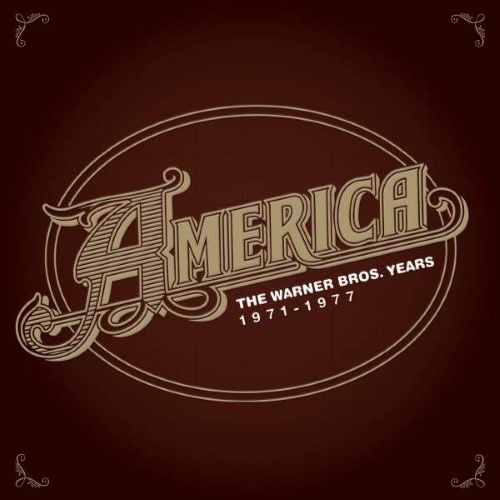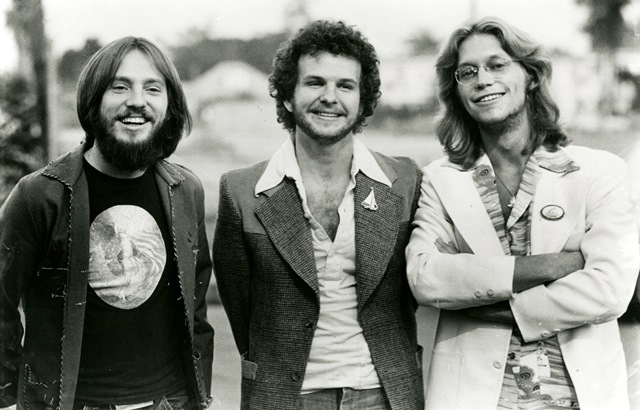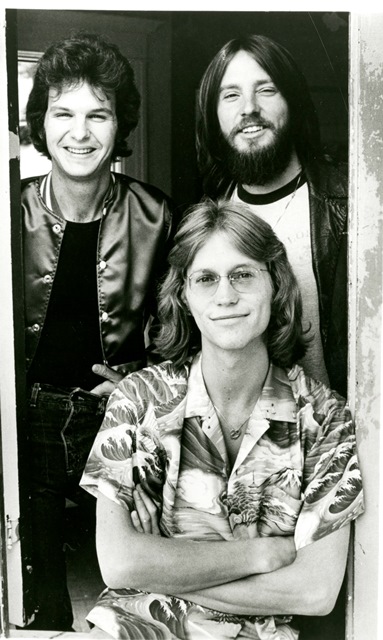Reissue CDs Weekly: America | reviews, news & interviews
Reissue CDs Weekly: America
Reissue CDs Weekly: America
Long shadows cast over the 'A Horse With No Name' trio by Crosby, Stills, Nash & Young

 America: The Warner Bros. Years 1971–1977
America: The Warner Bros. Years 1971–1977
Prime amongst the many ironies associated with Seventies soft-rock trio America is that when they reached number one in America in March 1972 with “A Horse With No Name”, the single they knocked off the top spot was Neil Young’s “Heart of Gold". “A Horse With No Name” sounds so like Young, it might as well be him. Young’s thoughts on the ousting are not a matter of record.
It went further. America’s fine, eponymous debut album is so much a Crosby, Stills, Nash & Young knock-off that frequent double takes are unavoidable. CSNY's distinctive, creamy vocal harmonies are present throughout. The track “Children”, with its “Come on children, get your heads back together” refrain, is almost a tribute to the Nash-composed “Teach Your Children”. Stephen Stills could actually be singing “Three Roses” and delivering “Sandman”’s stinging guitar.
Another irony is that the (initially) non-album hit single and album were recorded at Soho’s David Bowie-frequented Trident studio rather than in California. Gerry Beckley, Dewey Bunnell and Dan Peek were American citizens but the trio had formed in England. All three were in a quintet called The Daze and, after that foundered, they regrouped to form America. The trio first met in 1967 at the Central Elementary High School at Bushey Hall, north of London. The school was run by the United States Department of Defence for the children of force's employees working outside America. Beckley and co were the sons of military staff.
 Taking their loaded name from a brand of jukebox, America auditioned in 1970 for Jeff Dexter, the former mod and inveterate scenester who had been the DJ at Oxford Street’s hip Tiles Club, then Covent Garden’s hippy hangout Middle Earth and, latterly, at Camden’s Roundhouse, where he also promoted concerts. Dexter liked what he heard, became their manager and put them on a bill supporting The Who and Elton John. Through his childhood friend Ian Samwell, Dexter got America signed to Warner Bros. Records. The debut album’s sleeve was designed by Nigel Waymouth, of the UK psychedelic art and music duo Hapshash and the Coloured Coat. (Pictured above left, America in April 1976)
Taking their loaded name from a brand of jukebox, America auditioned in 1970 for Jeff Dexter, the former mod and inveterate scenester who had been the DJ at Oxford Street’s hip Tiles Club, then Covent Garden’s hippy hangout Middle Earth and, latterly, at Camden’s Roundhouse, where he also promoted concerts. Dexter liked what he heard, became their manager and put them on a bill supporting The Who and Elton John. Through his childhood friend Ian Samwell, Dexter got America signed to Warner Bros. Records. The debut album’s sleeve was designed by Nigel Waymouth, of the UK psychedelic art and music duo Hapshash and the Coloured Coat. (Pictured above left, America in April 1976)
Thus it was that a former mod and the writer of Cliff Richard’s “Move It” (Samwell) brought a group of American musicians based in England to a Soho studio and into the US and UK charts with a sound so Californian it could have been born in Laurel Canyon. Despite their name, passports and sound, America were a product of the British music business.
In a further twist, America initially wanted their first album to be an ornate production akin to the Beatles' Sgt. Pepper’s. Samwell, who produced it with Dexter, persuaded them to go for an acoustic-based American sound. From their fourth album onwards, 1974’s Holiday, they employed former Fabs maven George Martin as their producer. They did not, though, make any Beatles sound-a-like albums.
 Unfortunately, none of this extraordinary tale is communicated by the box set The Warner Bros. Years 1971–1977 as it does not include a booklet detailing the band’s story. Instead, the clamshell box contains their first eight albums with each disc housed in a CD-sized card replica of the original album’s sleeve with, where relevant, reproductions of lyric inserts (with utterly unreadable tiny print). A sticker on the package says each album has “remastered audio” but no details of this are given, and there are no bonus tracks drawn from the vaults. The version of the debut album includes “A Horse With No Name”: the single was added to pressings manufactured after it became a hit. Sloppily, the sleeve here does not list the track but instead reproduces the cover as it was before the track was added. (Pictured right, America in 1975)
Unfortunately, none of this extraordinary tale is communicated by the box set The Warner Bros. Years 1971–1977 as it does not include a booklet detailing the band’s story. Instead, the clamshell box contains their first eight albums with each disc housed in a CD-sized card replica of the original album’s sleeve with, where relevant, reproductions of lyric inserts (with utterly unreadable tiny print). A sticker on the package says each album has “remastered audio” but no details of this are given, and there are no bonus tracks drawn from the vaults. The version of the debut album includes “A Horse With No Name”: the single was added to pressings manufactured after it became a hit. Sloppily, the sleeve here does not list the track but instead reproduces the cover as it was before the track was added. (Pictured right, America in 1975)
Following the success with “A Horse With No Name”, America ditched Dexter and Samwell and moved to their titular country to record the aptly titled second album Homecoming, which they produced themselves. It opens with the wonderful “Ventura Highway”. The song still had the Stills-style vocal and CSNY harmonies but it edged towards a more direct, almost anthemic, sound. Overall, Homecoming is good, stuck to the formula but was a little muted. As a single, “Ventura Highway” limped into the British charts yet hit big in America. The UK soon forgot about America.
After treading water on the drab, mostly ponderous, 1973 third album, Hat Trick – only enlivened by its opening cut “Muskrat Love”, later covered by the Captain & Tennille – America turned to Martin to freshen their sound. The result, 1974’s Holiday, brought classy orchestration into the mix. The pick of the Martin-produced albums is 1975’s Hearts which, besides featuring the lovely “Sister Golden Hair”, opens with the emotive, sweet, Todd Rundgren-ish “Miss Jane” and peaks with “Bell Tree”, which casts a long a shadow over early Bon Iver. The album’s “Old Virginia” is another classy song, which hints at Paul McCartney. The final album collected is the inessential 1977 live set America Live.
The Warner Bros. Years 1971–1977 is certainly more America than anyone needs, but they made some fine albums which are worth digging into. If an entry point is needed, this may as well be it.
Add comment
The future of Arts Journalism
You can stop theartsdesk.com closing!
We urgently need financing to survive. Our fundraising drive has thus far raised £49,000 but we need to reach £100,000 or we will be forced to close. Please contribute here: https://gofund.me/c3f6033d
And if you can forward this information to anyone who might assist, we’d be grateful.

Subscribe to theartsdesk.com
Thank you for continuing to read our work on theartsdesk.com. For unlimited access to every article in its entirety, including our archive of more than 15,000 pieces, we're asking for £5 per month or £40 per year. We feel it's a very good deal, and hope you do too.
To take a subscription now simply click here.
And if you're looking for that extra gift for a friend or family member, why not treat them to a theartsdesk.com gift subscription?
more New music
 Benson Boone, O2 London review - sequins, spectacle and cheeky charm
Two hours of backwards-somersaults and British accents in a confetti-drenched spectacle
Benson Boone, O2 London review - sequins, spectacle and cheeky charm
Two hours of backwards-somersaults and British accents in a confetti-drenched spectacle
 Midlake's 'A Bridge to Far' is a tour-de-force folk-leaning psychedelic album
The Denton, Texas sextet fashions a career milestone
Midlake's 'A Bridge to Far' is a tour-de-force folk-leaning psychedelic album
The Denton, Texas sextet fashions a career milestone
 'Vicious Delicious' is a tasty, burlesque-rockin' debut from pop hellion Luvcat
Contagious yarns of lust and nightlife adventure from new pop minx
'Vicious Delicious' is a tasty, burlesque-rockin' debut from pop hellion Luvcat
Contagious yarns of lust and nightlife adventure from new pop minx
 Music Reissues Weekly: Hawkwind - Hall of the Mountain Grill
Exhaustive box set dedicated to the album which moved forward from the ‘Space Ritual’ era
Music Reissues Weekly: Hawkwind - Hall of the Mountain Grill
Exhaustive box set dedicated to the album which moved forward from the ‘Space Ritual’ era
 'Everybody Scream': Florence + The Machine's brooding sixth album
Hauntingly beautiful, this is a sombre slow burn, shifting steadily through gradients
'Everybody Scream': Florence + The Machine's brooding sixth album
Hauntingly beautiful, this is a sombre slow burn, shifting steadily through gradients
 Cat Burns finds 'How to Be Human' but maybe not her own sound
A charming and distinctive voice stifled by generic production
Cat Burns finds 'How to Be Human' but maybe not her own sound
A charming and distinctive voice stifled by generic production
 Todd Rundgren, London Palladium review - bold, soul-inclined makeover charms and enthrals
The wizard confirms why he is a true star
Todd Rundgren, London Palladium review - bold, soul-inclined makeover charms and enthrals
The wizard confirms why he is a true star
 It’s back to the beginning for the latest Dylan Bootleg
Eight CDs encompass Dylan’s earliest recordings up to his first major-league concert
It’s back to the beginning for the latest Dylan Bootleg
Eight CDs encompass Dylan’s earliest recordings up to his first major-league concert
 Ireland's Hilary Woods casts a hypnotic spell with 'Night CRIÚ'
The former bassist of the grunge-leaning trio JJ72 embraces the spectral
Ireland's Hilary Woods casts a hypnotic spell with 'Night CRIÚ'
The former bassist of the grunge-leaning trio JJ72 embraces the spectral
 Lily Allen's 'West End Girl' offers a bloody, broken view into the wreckage of her marriage
Singer's return after seven years away from music is autofiction in the brutally raw
Lily Allen's 'West End Girl' offers a bloody, broken view into the wreckage of her marriage
Singer's return after seven years away from music is autofiction in the brutally raw
 Music Reissues Weekly: Joe Meek - A Curious Mind
How the maverick Sixties producer’s preoccupations influenced his creations
Music Reissues Weekly: Joe Meek - A Curious Mind
How the maverick Sixties producer’s preoccupations influenced his creations

Comments
I largely disagree with those
Typical snotty undervaluing